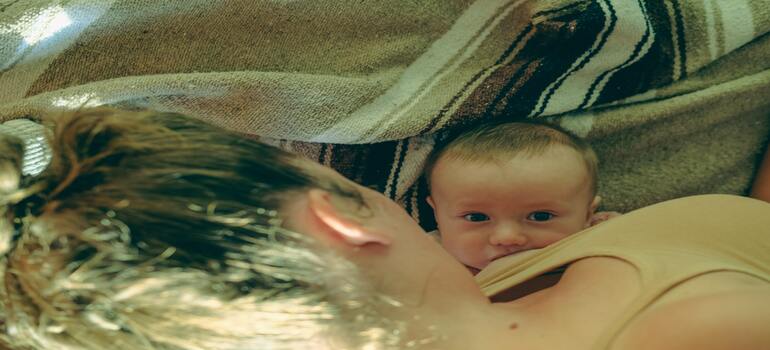A Guide To Winning At Weaning!

- October 21, 2020
- MKB Team
Baby foods to avoid
Disclaimer : Please check with your paediatrician first, in case of any allergies.
Whenever and however you stop breastfeeding, be gentle with yourself and your baby. It’s a big shift physically, hormonally and emotionally for you both, so do it with thought and care. Take on the process of weaning gradually and our weaning 101 is going to give you all the pointers you need, in one quick read.
KNOW WHAT'S OFF-LIMITS
Certain foods aren't appropriate for babies. Consider these guidelines :
1.Cow's Milk

Because it’s difficult to digest and can increase the risk of iron deficiency, you should hold off on cow’s milk until your baby’s first birthday.
2. Honey
Wild honey may contain spores of bacteria that can cause infant botulism, a rare but potentially deadly gastrointestinal condition.
3. Added salt and sugar
These could keep your child from developing a taste for foods in their natural state and, when given in excess, lead to health problems and tooth decay.
4. Hard, round and chewy foods
Once your baby is ready to start finger foods, usually around 7 to 10 months old, be sure that everything you give him is soft, cut into very small pieces and easily swallowed to prevent choking. Steer clear of nuts and seeds, whole grapes, hard fruit chunks, dollops of nut butter and popcorn.
5. Nuts and seeds
Groundnuts and seeds should not be given before 1.5 years as they can cause respiratory issues.
6. Fish and eggs
Many paediatricians recommend against giving eggs and fish in the first year of life because of allergic reactions, but there is no evidence that introducing these nutrient-dense foods after 4 to 6 months of age determines whether your baby will be allergic to them
7. Peanut butter and marshmallows
Other high-risk foods include peanut butter and marshmallows. To introduce nuts and prevent choking, spread peanut butter in a thin layer or puree peanut butter or peanuts with fruits or vegetables.
THE “4 DAY WAIT RULE” AND ALLERGIES:
It is important to follow the “four day wait” rule when introducing your baby to new solid foods and even more important if your family has a history of food allergies. When you introduce a new food over the course of several days, you are better able to determine exactly how your baby is reacting to that food. As mentioned, this is most important if you and/or your family members have a history of food allergies.
Following the four day wait rule and introducing new foods one at a time will also enable you to easily begin an “elimination diet”. If you suspect your baby has had an adverse reaction to a new food, you will have just a few foods to look to as the culprit. While we think the “4 day wait rule” is important, many parents don’t wait between introducing foods; it is up to you to decide if you want to follow the “wait” rule.
Is Waiting a Few Days Between Introducing New Foods Really Necessary?
There are many paediatricians who are now saying that waiting a few days before moving onto another food is not necessary at all. Considering new studies that point to the possibility that waiting to introduce allergenic foods may not prove to have any effect on future food allergies, the “4 day wait rule” seems unnecessary to some. This school of thought has caught on in many circles. In the end, you should take history of food allergies/other allergies into consideration and then decide if you want to follow “the rule” or not.
Top 8 Allergenic Foods that account for 90% of all Food Allergies
- Milk
- Egg
- Peanut
- Tree nut (walnut, cashew, etc.)
- Fish
- Shellfish
- Soy
- Wheat
Children may outgrow food allergies to milk, eggs, soybean products and wheat. Please note that a Wheat Allergy is different from Gluten Intolerance. Gluten Intolerance (Celiac’s Disease) is never outgrown and must be managed. Children (and Adults) rarely outgrow allergies to peanuts, tree nuts, fish and shellfish.
How to Spot a Potential Allergic Reaction to Food
Here are several things you might note that may indicate baby has a potential allergic reaction or intolerance to a food.
- Sudden loose, diarrhoea stools and/or vomiting
- Sudden rashes on the skin and bottom
- Runny Nose
- Hives
- Irritability and/or gassiness after a new food/meal
- Breathing or other respiratory troubles after a new food/meal
- Swelling of the Face, Lips and/or Tongue
- Closure or tightening of the throat
Not all reactions in babies require treatment. For example, a mild rash is likely to fade within a few hours and may not trouble the baby in that time. If the symptoms of a reaction are causing visible discomfort, treatment may be necessary. The treatment can vary according to the type of rash or reaction. If the rash spreads or worsens over time, a person should consult a doctor. It is also essential to seek medical advice if the skin shows signs of an infection, such as blistering, bleeding, or seeping fluid.
Published by
MKB Team
200 Articles
MomsKnowBest is a fast-growing vibrant community of moms, for moms, by moms. Motherhood is complex fun, fulfilling, grueling, exhausting and very complex. There’s no handbook to it. And let’s face it – moms are put...
Read MoreShare with your friends!
Leave a Comment
Trending Post
Myth Buster: Having iron tablets makes your child...
Busting Top 10 Pregnancy Myths about having Iron Tablets
One of the Top 10 pregnancy myths is that...
Health Benefits of Pomelo For Moms To-Be & Kids
During pregnancy, women need proper nutrition to support their health as well as the growth of the...



